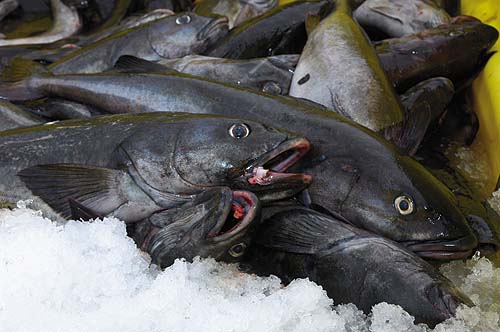 Commercial fishing in Oregon may be looking to its past to help sustain its future. Some Oregon fishermen increasingly are considering selling their catch directly to local consumers through a possible Community-Based Fishery Management program, similar to the popular Community Supported Agriculture programs.
Commercial fishing in Oregon may be looking to its past to help sustain its future. Some Oregon fishermen increasingly are considering selling their catch directly to local consumers through a possible Community-Based Fishery Management program, similar to the popular Community Supported Agriculture programs.
 |
Ecotrust is exploring public opinion around creating a direct-to-consumer program for fishermen much like the community supported agriculture programs that have become so successful. |
Commercial fishing in Oregon may be looking to its past to help sustain its future. Some Oregon fishermen increasingly are considering selling their catch directly to local consumers through a possible Community-Based Fishery Management program, similar to the popular Community Supported Agriculture programs.
A community supported fishery program (CSF) “is another way to bring that local food circle into local markets … to reduce some of the processing that goes on and bring communities together,” says Ecotrust spokesman Jon Bonkowski. Ecotrust, a Portland-based environmental advocacy group, sent a survey in July to its email subscribers to gauge public interest in the potential development of CSFs in Oregon.
According to Ecotrust, existing fishery management policy emphasizes the fishing of single species, rewards high catches and penalizes diversified fleets; with the overall effect being rapidly depleting fisheries and fishermen working against resource managers. “You can’t just catch one species … Seasons are short, market opportunities change,” says Florence-based commercial fisherman and fish market owner Al Pazar. The periodic allotment of seafood to the consumer would vary according to seasonality and availability based on sustainable fish numbers. Pazar sells directly to a reliable base of local customers, about 600 of whom pick up orders on the dock in Florence.
The majority of fishermen sell their catch to fish processors for a fraction of what they could make selling directly to the consumer. By selling to the processor, fishermen don’t have to worry about large overhead costs such as shipping and marketing.
“There are times when I am tired,” Pazar says, about taking on distribution and sales tasks.
“There are certain fishermen who will embrace that [CSF] philosophy and do it well and there are certain fishermen who will keep on selling direct to canneries.”
Major Northwest seafood processor Pacific Seafood of Clackamas declined to comment on how CSFs would affect business. Ecotrust’s survey closed in August. It plans to work with those communities receptive to the idea. “If it’s not something people are interested in, we’re not going to force it onto them,” Bonkowski says.

